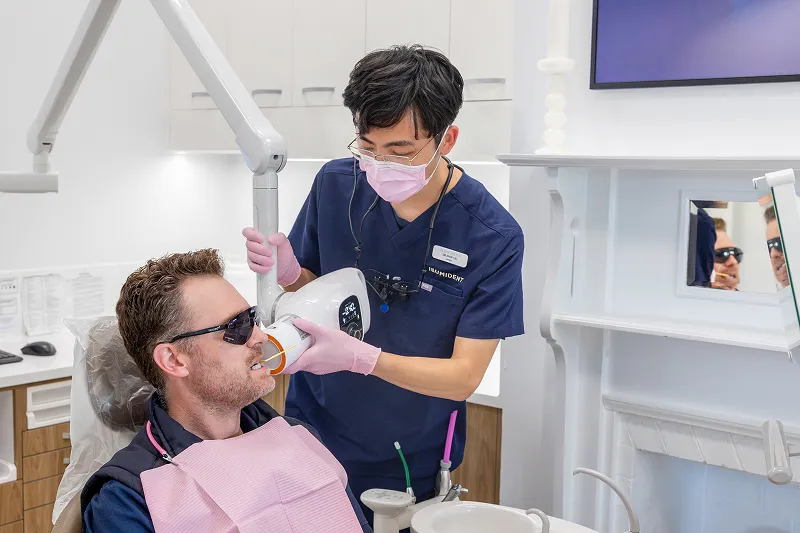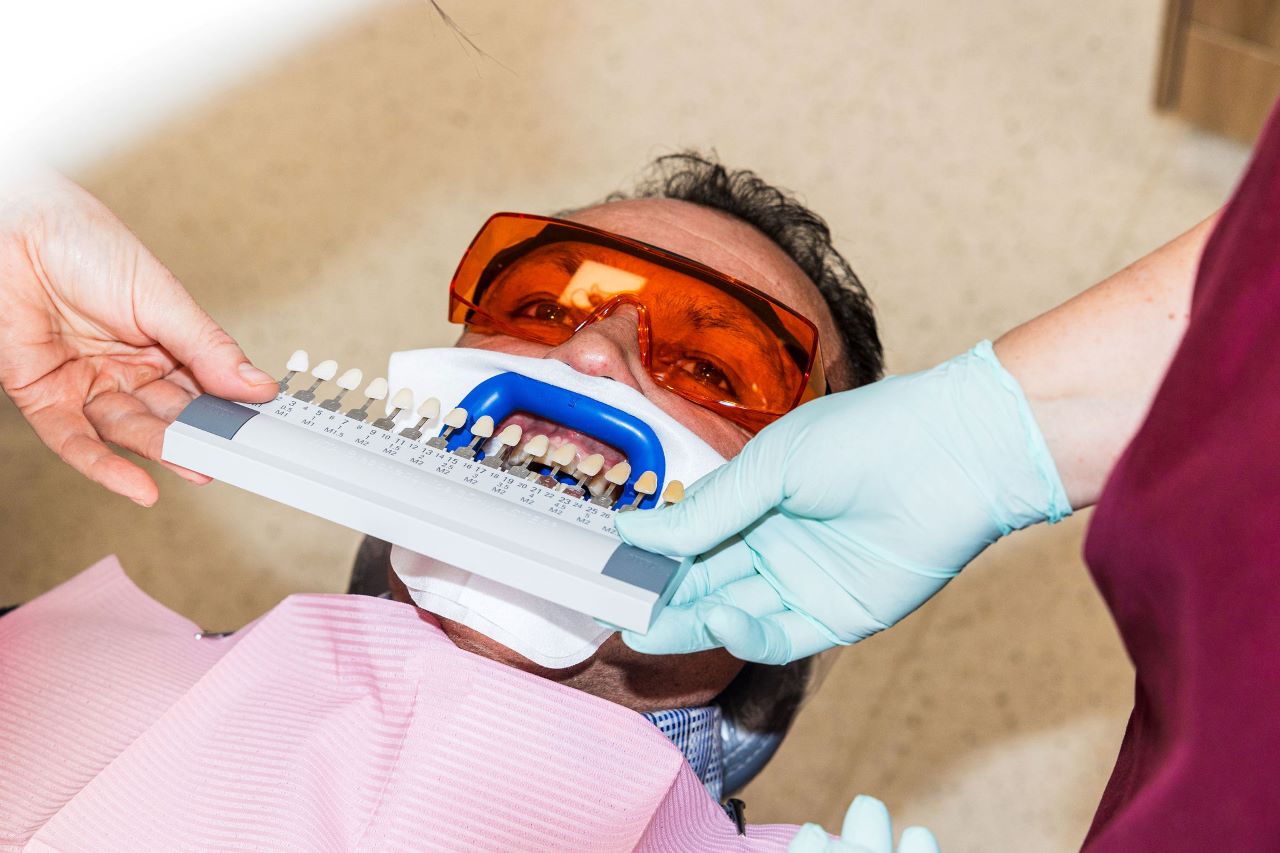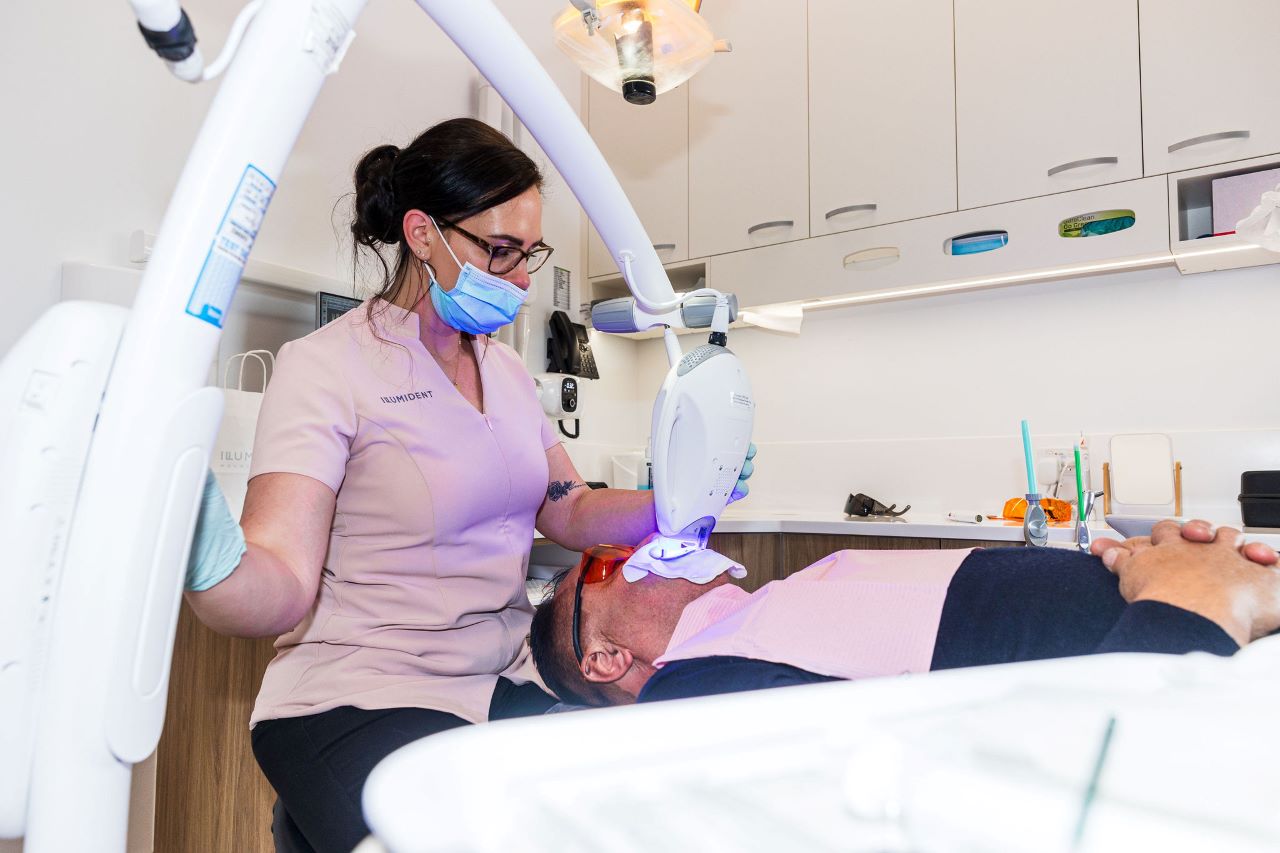Gum disease is one of the most common diseases in Australian adults. In fact, 30% of Australian adults have moderate to severe gum disease. It’s also one of the top causes of adult tooth loss.
The alarming thing about gum disease is that, while it’s extremely common, it’s also a ‘silent’ disease. This means it’s often painless with subtle or no symptoms. Plus, it can sneak up on you even when you have good oral hygiene habits like daily brushing and flossing.
Often, the lack of any pain or noticeable symptoms in its early stages means that gum disease can be left undiagnosed and untreated for a long time. This is especially true for those who don’t visit their dentist regularly.
So, why is this a problem?
The early stages of gum disease can be treated and cured. But if gum disease progresses to an advanced stage, this can cause irreversible damage and is a condition that must be managed for the rest of your life. If left untreated, advanced gum disease can lead to tooth loss.
Keep reading to learn how to spot the warning signs and symptoms of gum disease and how it can be treated.
Disclaimer: This article contains general advice and should not be used to diagnose or treat gum disease. If you are concerned about your gum health, please book an appointment with your dental professional for a clinical assessment.
What is gum disease?
Gum disease (also called periodontal disease) is a chronic inflammatory condition that affects the gums and jaw bone. It occurs when the gum tissues become inflamed or infected due to plaque and bacteria build up on your teeth and along the gum line.
Stages of gum disease
There are two main stages of gum disease:
Gingivitis
Gingivitis is early-stage gum disease that only affects the surface layers of the gum. This is when the gums become inflamed as they try to fight the bacteria that live in the plaque around your teeth. When caught at this early stage, gingivitis can be treated without permanent damage to the teeth, gums or jaw bone.

Periodontitis
If left untreated, gingivitis can progress to periodontitis — the advanced stage of gum disease. Periodontitis affects the deeper layers of the gum tissues and progressively destroys the ligaments and bone structures surrounding the teeth. This destruction creates ‘pockets’ between the teeth and gums, which become deeper the more the disease progresses. The damage is irreversible and over time, the teeth will become loose and may eventually fall out. Periodontitis cannot be cured but can be managed and stabilised through ongoing treatment to maintain bone levels and stop disease progression.
What causes gum disease?
Gum disease is caused by bacteria in plaque that builds up on the teeth and along the gumline if you don’t brush, floss or get professional dental cleaning regularly. This bacteria triggers the body’s immune system response, leading to inflammation and infection of the gums.
While the primary cause is plaque build-up, there are other health and lifestyle factors that also increase the risk factors of developing gum disease.
Other causes of gum disease may include:
- Hormonal changes (e.g. pregnancy gingivitis)
- Certain medications
- Hereditary factors (e.g. family history of gum disease)
- Smoking
- Stress
- Diabetes
- Immunodeficiency diseases
- Old failing dental work
- Crooked, overcrowded teeth
Gum disease symptoms
As we mentioned above, early gum disease signs can be very difficult to spot. By the time you feel any pain or notice any obvious gum disease symptoms, your condition may have already progressed to the advanced stage.
However, there are a few signs of gum disease that you can look out for:
- Bleeding gums when you brush or floss
- Red or purple gums
- Swollen, tender or painful gums
- Pain when eating or chewing
- New gaps between your teeth
- Bad breath that won’t go away
- Wobbly or loose teeth
- Gum coming away from your teeth
Early detection and treatment is key to preventing gingivitis and managing periodontitis. This is why it’s so important to have regular check-ups with your dentist so they can keep an eye on your gum health and catch any warning signs early.
Get gentle care for a strong defence against gum disease
Book an appointment now or download our guide for more info on our fees.

Can gum disease be cured?
Yes — but only if it’s caught early. When it comes to gum disease, the further the disease progresses, the harder it becomes to treat.
If gingivitis is treated early before it progresses to periodontitis, the damage can be reversed and the gums can recover. With ongoing professional treatment and good at-home care, most patients go on to experience good gum health.
However, if gingivitis progresses to periodontitis, the effects can not always be reversed or cured. Instead, the condition must be managed for the rest of your life to stop it from worsening.
How to treat gum disease
When it comes to gum disease treatment, the earlier, the better.
Regardless of the stage, gum disease therapy requires special ongoing care both at home and with your dental practitioner.

There are a number of gum disease treatment options, depending on:
- The stage and severity of gum disease
- Whether you’ve had any previous treatment for gum disease
- Your overall health
Your dental practitioner may perform your treatment at their dental practice or, if you have severe periodontal disease, they may refer you to a periodontist.
Gum disease therapy can be broken into two categories: Non-surgical and surgical. We’ll explore these in more detail below.
Non-surgical gum disease treatment
This type of gum disease therapy may include:
- Professional thorough cleaning (scaling and root planing) removes plaque and calculus above and below the gum line
- Airflow/Perioflow to flush bacteria from pockets in the gum
- Antibiotics to control the infection
- Repairing or replacing existing dental work that may be contributing to the gum disease
- Introduction of a personalised at-home oral health care routine
Surgical gum disease treatment
The surgical treatment approach may include:
- Pocket reduction surgery
- Guided tissue regeneration
- Bone or gum grafting
- Laser gum therapy
How much does gum disease treatment cost?
The cost of treating gum disease will vary depending on the type of treatment you need and the number of appointments you’ll have. Your dentist will develop a personalised treatment plan for you after they have made an assessment and diagnosis of your condition.
If you’re concerned about the cost of treatment, we offer flexible payment plans, including Afterpay, so you can get the care your smile needs without the financial fuss.
Can I get rid of gum disease without going to the dentist?
The short answer is — no. Gum disease cannot be treated, stabilised or managed without the help of your dentist.
Once you’re diagnosed with gum disease, it’s crucial that you attend your scheduled periodontal maintenance appointments and follow your new at-home care guidelines to stop the condition from worsening.
What will happen if I don’t get treatment for gum disease?
If left untreated, advanced gum disease can destroy the gum tissues, ligaments and bone that support your teeth, resulting in jaw bone loss and tooth loss.
Untreated gum disease can also have serious implications for your overall health. Gum disease is a ‘whole body disease’. This means that the bacteria and inflammation associated with it can spread beyond the mouth, leading to systemic inflammation throughout the body. This increases your risk of other systemic health conditions, such as diabetes, heart disease, stroke, dementia, pregnancy complications and more.
How can you tell if you have gum disease?
This is the tricky part. Many people with gingivitis don’t even realise they have it because it’s usually painless and has no obvious symptoms. This means that visiting your dentist for regular six-monthly check-ups is your best defence against gum disease. Your dentist will be able to spot gingivitis in its early stage, giving you the best chance at successful treatment.
If you’re concerned about your gum health or have noticed any of the gum disease signs mentioned earlier, don’t delay! Contact us immediately on (08) 8725 2441 for our Mount Gambier dental clinic or on (03) 5568 2577 for our Port Fairy dental practice for a professional check-up and gum health assessment.











.svg)














